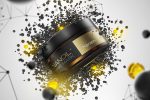Natural soap vs syndet – which to choose and what do I prefer?

Modern cleaning products are very different from once popular grey soap or classic natural soaps. Most of them don’t contain plant extracts, which is why they can hurt more than help. The same applies to syndet which has a chemical composition. Before I answer the question what to choose: a natural soap or syndet and what my choice is, I will precisely explain what natural soap, syndet, glycerine soap and combo are.
Soap – properties
Soap is one of the oldest cosmetics in the world invented by the Phoenicians. Although it is difficult to imagine basic hygiene without soap, its foaming properties and fresh fragrance, modern soaps have little to do with classic soaps. The ones available in the drugstore usually only please the eye. They don’t contain any moisturising ingredients and any substances that would be healthy for the skin. Instead, they are full of colouring substances, preservatives, fragrances. For this reason, not everybody can use soaps – it is not recommended for people with sensitive (allergic, atopic) skin. Fortunately, there are plenty of cleansing products that are safer and healthy.
How does soap work?
The magic lies in the fact that all soaps form an emulsion when in contact with water. The soap clean because the micelles of soap trap the fats and dirt within the micelle.
Natural soap – what is it?
It is hard to believe but the classic, most ordinary soap has become an elite product available only in stores with natural products. Such soaps are based on vegetable oils or animal fats and lye. The soaps that are the most available are cleaning products in the form of syndets or cubes. They are based on salts of fatty acids and a combination of additives, including fragrances, preservatives and some consistency modifiers. Majority of soaps have alkaline pH (above 8.5) which is much higher than the natural pH of the skin. For this reason, they can dry and irritate the skin so they are not recommended for the people with dry and sensitive skin.
Natural soap needs to cure for at least several weeks – the longer the process, the lower the pH. Natural soap is usually an oily and skin-friendly soap that contains natural, often organic plant ingredients. Such components improve its aroma and add to its care properties.
Syndet – what is it?
Syndet is a soap without soap, as if. It was invented for the needs of American army, because it works well in extreme conditions:
- foams in every water, including sea water;
- when it dissolves, it is slightly acidic (pH below 7.0) which makes it suitable for all skin types.
It can be assumed that syndet is a cleaning product that does not contain soap. It is made of synthetic ingredients, usually a mixture or detergents.
Syndets often contain fatty alcohol ethoxylates, sulphosuccinates, sarcosinates, acylpeptides and alkyl polyglucosides. To soften their cleansing effect, syndets are often enriched with moisturising ingredients, such as creams and vegetable oils.
Glycerin soap – what is it?
Glycerine soap is less alkaline than classic soap. Thanks to the addition of glycerine, the soap has moisturising properties. Glycerin soap can be used with all skin types except oily skin.
Combo – what is it?
Combo is a cleaning product that contains soap or other cleaning substances, usually synthetic. It is an alkaline preparation with a pH lower than the pH of the soap. Generally, it foams very well.
Natural soap vs syndet – which to choose? What is my choice?
Taking the above into account, no one doubts that natural soap is better for the skin. It does not irritate nor sensitize the skin, so it can be used regardless of the type of skin. I really like natural soaps and don’t use any other cleansing products. This is what helps me keep my skin clean and healthy.
What do you prefer: soap or syndet (and why?)?





Leave a Reply